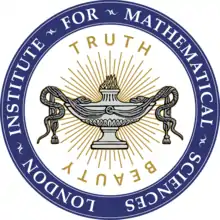London Institute for Mathematical Sciences
The London Institute (officially the London Institute for Mathematical Sciences) is a private academic research centre in London that conducts research in physics, mathematics and the theoretical sciences. The Institute does not award degrees and there are no teaching or administrative duties.
| Motto | Truth, Beauty |
|---|---|
| Type | Private research institute |
| Established | 2011 |
| Location | Mayfair, London, UK |
| Website | lims |
 | |
History
The London Institute was founded in 2011 when it became a registered charity. It was conceived as a research centre where scientists could focus full-time on curiosity-driven research, unencumbered by teaching and other duties.[1] Its first research grant was from the Defense Advanced Research Projects Agency.[2]
In 2019, the London Institute was awarded Independent Research Organisation status by the Engineering and Physical Sciences Research Council.[3] It is the UK's first private research centre in the physical sciences to be allowed to compete with universities for funding from the seven Research Councils.[4]
The Institute occupies a five-floor Georgian townhouse in Mayfair, London. The Grade II* listed building has been refurbished in part through gifts from the Garfield Weston Foundation and the Rose Foundation.
Organization
The Director of the London Institute is Thomas Fink. Its Board of Trustees includes Sir Roy Anderson, FRS, former chief scientist at the Ministry of Defence; Sir John Beddington, FRS, recently the UK government's chief scientific adviser; Martin Reeves, Global Director at Boston Consulting Group; and Sir Peter Williams, FRS, former Vice President of the Royal Society.
Former members of the Board of Trustees include Baroness Meyer, a life peer and member of the House of Lords; Luciano Pietronero, physicist and winner of the Enrico Fermi Prize; Dame Shirley Porter, former Leader of Westminster City Council and founder of the Porter School of Environmental Studies in Tel Aviv University; and Tom Tombrello, physicist and chair of the Division of Physics, Mathematics and Astronomy at Caltech from 1998 to 2008.
The Institute avoids traditional departmental boundaries between academic disciplines, so research draws on multidisciplinary knowledge. Scientists and non-scientists are not segregated but work closely together, so everyone is involved in funding, carrying out and communicating discoveries.[5]
Research
The London Institute does research in theoretical physics, mathematics and the mathematical sciences. It does not have laboratories and does not conduct experiments. While there is no top-down prescription of what research is supported, areas of focus include or have included statistical physics, graph theory, cell programming, forecasting, finance, quantum theory, network theory, machine learning, thermodynamics, innovation, information theory, fractals and dynamical systems.[6]
Funding
The London Institute is funded by research grants from the EU's Horizon 2020, the European Innovation Council, DARPA, the US Department of Defense, the Ministry of Defence, the Medical Research Council and Cancer Research UK.
References
- "How British science can flourish".
- "Unwinding nature's clocks, with $14 million from DARPA". EurekaAlert!, The American Association for the Advancement of Science.
- "Independent Research Organisations". UK Research and Innovation.
- "'We need to challenge the university monopoly on research'". Times Higher Education. 4 April 2019.
- "Sage of Discovery". Business Life, British Airways. April 2019.
- "Research topics". London Institute for Mathematical Sciences.